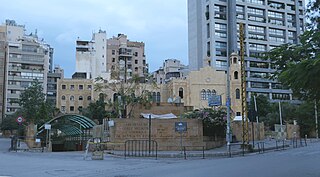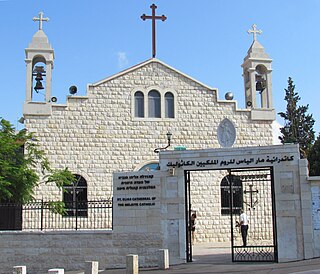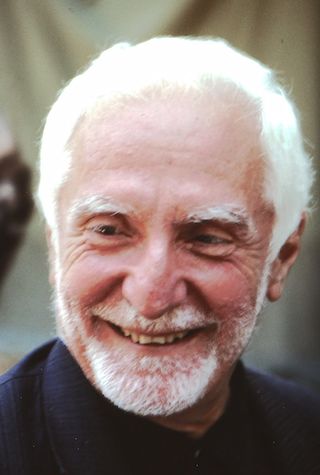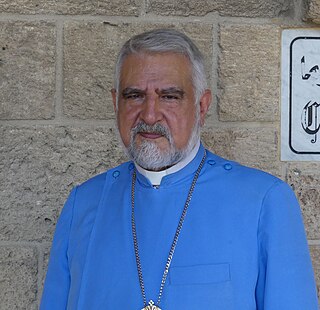
The Archeparchy of Beirut and Byblos is a metropolitan eparchy of the Melkite Greek Catholic Church since 1881, an Eastern Catholic church in communion with the Roman Catholic Church. Located in Lebanon, it includes the cities of Beirut and Byblos, and in terms of population, it is the largest Melkite eparchy in the Middle East. Its current Eparch, Georges Wadih Bacouni, S.M.S.P., was elected in November 2018.

Melkite Greek Catholic Archeparchy of Akka is an Eastern Catholic diocese of Melkite Greek Catholic Church, directly subject to the Melkite Catholic Patriarchate of Antioch. Its Cathedral episcopal see is St. Elijah Greek-Melkite Cathedral, in Haifa.
Joseph Kallas, SMSP is Emeritus Melkite Archbishop of the Melkite Greek Catholic Archeparchy of Beirut and Byblos.
Joseph Gébara is a Lebanese Catholic archeparch of the Byzantine Rite, and current Archeparch of the Melkite Greek Catholic Archeparchy of Petra and Philadelphia in Amman.

Grégoire Haddad in Arabic was Archeparch of the Melkite Greek Catholic Archeparchy of Beirut and Byblos from 1968 to 1975. He was known as the "Red Bishop of Beirut" promoting a secular "social movement" and a platform of rapprochement between Muslims and Christians with the onslaught of the Lebanese Civil War. He reinforced his controversial viewpoints through further secular movements and through Afaq magazine, which he founded. In 1975 under pressure from the Holy See, he resigned from active religious duty. Since his resignation, he became an emeritus archbishop without holding an actual diocese in Lebanon.
Habib Bacha, SMSP was Melkite Archbishop of the Melkite Greek Catholic Archeparchy of Beirut and Byblos.
Mikhayl Assaf was the second archbishop of the Melkite Greek Catholic Church of the Melkite Greek Catholic Archeparchy of Petra and Philadelphia in Amman. He was the successor to Archbishop Paul Salman.

Yasser Ayyash is a former archbishop of the Melkite Greek Catholic Archeparchy of Petra and Philadelphia in Amman and the current Melkite Greek Catholic Patriarchal Archeparchy of Jerusalem.
Georges Nicolas Haddad, SMSP is the current bishop of the Melkite Greek Catholic Archeparchy of Baniyas, Lebanon.
Jean-Abdo Arbach, B.C., is the current archeparch of the Melkite Greek Catholic Archeparchy of Homs, Hama and Yabroud.
Melkite Greek Catholic Archeparchy of Baniyas is a diocese of the Melkite Greek Catholic Church suffragan of the Melkite Greek Catholic Archeparchy of Tyre. In 2009 there were 2,500 baptized. It is currently governed by Archeparch Georges Nicholas Haddad, SMSP. The Archeparchy is named after the city of Baniyas in the Golan Heights at the foot of Mount Hermon.

Melkite Greek Catholic Archeparchy of Tyre is a metropolitan see of the Melkite Greek Catholic Church. In 2009 there were 3,100 baptized. It is currently governed by an Apostolic Administrator, Archbishop Elie Bechara Haddad, B.S., because of the 31 January 2021 removal of Archeparch Michael Abrass, BA.

Michel Abrass, BA is a retired church official who was Archbishop of the Melkite Greek Catholic Archeparchy of Tyre from 2014 to 2021.
Jean Assaad Haddad was a Lebanese Melkite hierarch, who served as an archbishop of the Melkite Greek Catholic Archeparchy of Tyre in Lebanon.
Eduard Georges Daher, B.C., is the current Melkite Greek Catholic Archbishop of the Melkite Greek Catholic Archeparchy of Tripoli.
Augustin Farah was an archbishop of the Melkite Greek Catholic Archeparchy of Tripoli and the Melkite Greek Catholic Archeparchy of Zahle and Forzol.
Melkite Greek Catholic Archeparchy of Sidon is a diocese of the Melkite Greek Catholic Church suffragan of the Melkite Greek Catholic Archeparchy of Tyre. It is governed by Archeparch Elie Bechara Haddad. The territory is made up of 53 parishes and, as of 2010, 32,000 Melkite Catholics.
Elie Bechara Haddad, BS is a Lebanese prelate of the Melkite Greek Catholic Church who has been the Archeparch of the Melkite Greek Catholic Archeparchy of Sidon since 2007.
André Haddad, BS was an archbishop of the Melkite Greek Catholic Archeparchy of Zahle and Forzol.

Youssef Absi is the current patriarch of the Melkite Greek Catholic Church, serving since June 21, 2017.







